A small guide for those wanting to write but struggling to get started
Some advice from 15 years of mucking about the "content" space.
In my role as a mentor at The 6% Club, I’ve found myself giving the below advice in some shape or form over 6 cohorts. It’s been useful to attendees of the program, and I thought I’d write it out fully to solidify it in my own head, and hopefully help others out as well. I’m going to be specific to writing (a blog or newsletter) here, since that’s the easiest to action (Podcasts and videos have a learning curve). That being said, this advice is extrapolatable to any medium or format.
Starting a Substack can feel intimidating. More often than not, the concerns are:
Surfeit of ideas (I am interested in many things, what do I pick to write about?)
Audience reaction (Will people like what I do? What will my friends/colleagues think? Will it even get a reaction? Will I find an audience?)
Idea uniqueness (I want to write about football but there are thousands of football newsletters out there, why would mine stand out?)
While these are all valid concerns, I don’t think someone starting out should worry about them too much. You are doing this to have a creative outlet, not to sell a product. Uniqueness and sharpness of idea will come with time, not at the beginning. Every single successful creator - ranging from The Beatles to Mr Beast, from Jackie Chan to Tanmay Bhat - started out imitating others, before finding their uniqueness and honing it1. You cannot shortcut this process.
Here’s how I recommend you think about it.
Step Zero:
The first and foremost thing you need to do is to have fun.
If you were picking up a guitar for the first time and gave yourself the pressure of “when will I perform at Lollapalooza”… imagine how tough you’re making it for yourself. On the other hand, if you were to just explore the instrument, playing for fun, trying to imitate your favourite riffs… That’s how you get comfortable playing, and eventually find what you like doing, and what your unique style is.
Same thing with whatever you want to write about. Enjoy the process, enjoy the learning, enjoy the act of creating for yourself. Finding your voice will take time, so you might as well enjoy the journey. Every creator who ended up finding success - fame, unique format, etc - did so on the back of years of trying and consistency. They would have given up if they were not having fun or got frustrated they weren’t landing brand deals from day three.2
I am reminded of something the ace stand-up comic Abish Mathew told us in an interview we did with him:
I’ll say three things here that might be either off-putting or liberating, depending on your point of view:
You will take at least a year to find your voice.
In your first year, YOU are your most important audience.
Don’t overthink what others might think. Everyone’s too busy.
With that preliminary bit of gyaan out of the way, let’s get on to what you can actually do, and how you can do it.
Step one:
Think of five topics you can write about right away AND are excited about.
This is a way to force out how you think, what you’re good at, what you know, what you’d like to explore, and so on. Again, don’t worry about ideal formats or what the audience may think - remember step zero.
Scribble the topics (not the full post) on paper. It doesn’t matter if all five are wildly different from each other. In fact, giving all possible formats, structures, lengths a chance is a good way of narrowing down what actually works. Of course, if you’re already reasonably clear that you want to write about something (say, football; technology-based fiction; music commentary; B2B SaaS) then your 5 topics can fall within those. Don’t be afraid of going wide at the start.
Finding your niche at the beginning is impossible. And it’s overrated. Again, you’re not trying to find product-market fit here. But if you want to think of it that way, you need to arrive at the product itself first!
Importantly, these five topics are not necessarily things that you can do quickly. Some topics you may be able to crank out in half an hour, but others may take days. But remember the step - you need to be excited about doing, researching and thinking about it, even if it takes a week.
You can choose to keep the output private, or circulate it among a small friends group. But really, this step is just about getting it out of your system rather than getting it out into the universe.
I said five topics but that’s just to help you get started. You should find a cadence that works for you - a post a fortnight would be good. In other words, keep at step one for a couple of months at least. So hopefully in 3 months you’ll have 5-10 posts of varying types. And hopefully had fun along the way.
Again, don’t worry about audience, uniqueness, and all that. That’ll come with time. Let’s speak about how to get there.
Step two:
Developing meta thoughts
Suppose you’ve been writing for even just 2-3 months. You will start developing what I like to call ‘meta thoughts’. These could be…
Your own hypotheses about the topic you’re writing about
The kind of writing / format you gravitate towards more
For instance, suppose you start off writing book reviews - hardly a unique idea. After writing for 2 months, you realise you’re more drawn to characters than the book or plot as a whole. So you can change the focus of your Substack to celebrating interesting characters, which is certainly sharper than your original idea.
I’d like to give my own example over here. Things of Internet - this very newsletter - has gone through several phases in its 5 years of existence. I’m realising that my interests are now about how technology impacts culture - something I want to focus on more in the future.
Meta thoughts could vary from specific to broad and will keep evolving the more you create. You may have them from day one, or it may take a year. Either way, I recommend actively reflecting - it’s an underrated part of creating, and will determine where you want to go with your idea.
You may realise that you started off writing about B2B SaaS but are actually more interested in the philosophy of the internet. You may start off with a podcast on football but are more interested in banter with your co-hosts3. You may start off making Reels on Bengaluru’s green spaces and realise that espousing slow living is your sweet spot. Thinking about meta lessons can help sharpen what you do, or even broaden its scope.
Which takes us nicely to…
Step three:
Think about what your book is going to be
Woah woah boss. I’m palpitating about my first post and already you’re saying book and all what is this.
Yes, let me back up and tell you what I mean. I don’t mean that you need to write a book. But a book is a pithy summation of all your thoughts. In a way, it’s taking your meta-thoughts to the logical conclusion. What is YOUR take on football, or B2B SaaS or Bengaluru’s green spaces? What format do you want it? Graphic novel or short stories? Which section of the bookstore do you want it to be?4
You’ll see that whatever your end-game is, will end up dictating what you do today, in a small way.
For example, let’s say you’re writing about finance and randomly like the idea of eventually writing a book on personal finance in poetry form. Great. So you now know what to change in step one - give finance-through-verse a shot. Otherwise, you may fancy the idea of a graphic novel to explain marketing. Great, collaborate with an artist. Thinking about your end-game gives you the steps you need to take, or at least experiment with, today.
An end-game idea can change all the time, BTW, and that’s perfectly okay. There are times I think I should write a book about technology. Other times I think I should write one on philosophy. Whatever the case, it gives me direction on what I need to do, research or try right now.
Putting the three together: The Engine
I gave you three things to think about. And people who have been following my newsletter for a while know what’s coming. Yes that’s right. Here comes…
So here’s a little framework for budding creators I call The Engine.
Steps one, two and three as I’d written above are in constant interplay with each other.
The more you write today, the more meta-thoughts you will have tomorrow, which end up dictating your end-game day after tomorrow. I think that any creator will have some version of this in their heads - constantly whirring and changing with every new post written, every piece of inspiration consumed.
This framework is also useful in another way - if you do find yourself dreaming about an end-game idea (again, ‘fame’, ‘lots of subscribers’ are NOT end-games - they are outcomes), this framework can help go the other way and help you think about what you need to do an action today. So let’s complete that…
I find this useful for new creators because whenever you’re bogged down by “that’s a 3 years from now problem” like monetisation or audiences or fame… bring it back to what you need to action today.
Last words
As you can tell, I’m not too keen on hacks like gaming the algorithm, ideal time to post, ideal text:image ratio and things like that. I don’t think such things exist, and are unsustainable as the landscape keeps changing. Again, you’re writing to have fun. At least in your first year, you shouldn’t be thinking about things like this, just like someone who’s just picked up the guitar last week shouldn’t be worrying about intra-music festival logistics travel.
I’m more keen that you create for fun, and get into the habit. Your uniqueness will follow, and possibly fame and all that later. I’ll end with one of the most meaningful things my co-founder Utsav tells participants of our program:
It’s a simple, but deeply profound thought.
So go on, get writing. Or podcasting. Or drawing. Don’t give a damn about whether it’s unique. Chances are, it’s not. But then, neither was Led Zeppelin or Van Gogh when they started out.
Have fun!
Chuck
PS1 : I’ll repeat myself - I used writing as the medium above since that’s the easiest for most people to get started. But this can be extended to any medium.
PS2: Plug! And of course, if you think you need some help and more well-intentioned gyaan and formal accountability, The 6% Club would be happy to help you. Details and registration here.
A good exercise is to take creators you are really fond of, who inspire you, and look at their work in reverse chronological order. Chances are, what they started off as will be very different from what you know them for. Mr Beast’s first few years were all Minecraft videos before he finally found the formula that made him famous. MKBHD had 74 subscribers at the time of his 100th video. Heck, even Pink Floyd mucked around for 8 albums before they definitively found their sound. You cannot shortcut “finding your voice”.
What if you’re starting a Substack not to have fun / find a creative outlet, but to build a personal brand and come across as a subject matter expert in your chosen space? Well here, you need to actually be a SME in the first place, having a Substack on B2B SaaS doesn’t automatically make you an expert in one. Then, you just need to keep writing. It’s likely you have a professional network you can leverage on, too. A lot of what I wrote above is still valid for you, even if the end goal is slightly different.
Simblified, my first podcast, started with the grand goal of breaking down the news of the week in easy-to-understand language. Turns out, nobody cared a hoot for that, but thousands tuned in to hear us make bad jokes. Our banter was the selling point of the show.
As you may have realised, I’m using ‘book’ as a random end-game format here. It could be a TED talk, it could be a documentary, it could be a YouTube video, anything. The broad idea is to have an actualised, ideal end project to work towards. Knowing this will help dictate what to do today. I often feel that thinking about this without the constraints of today helps give direction without feeling stifling.



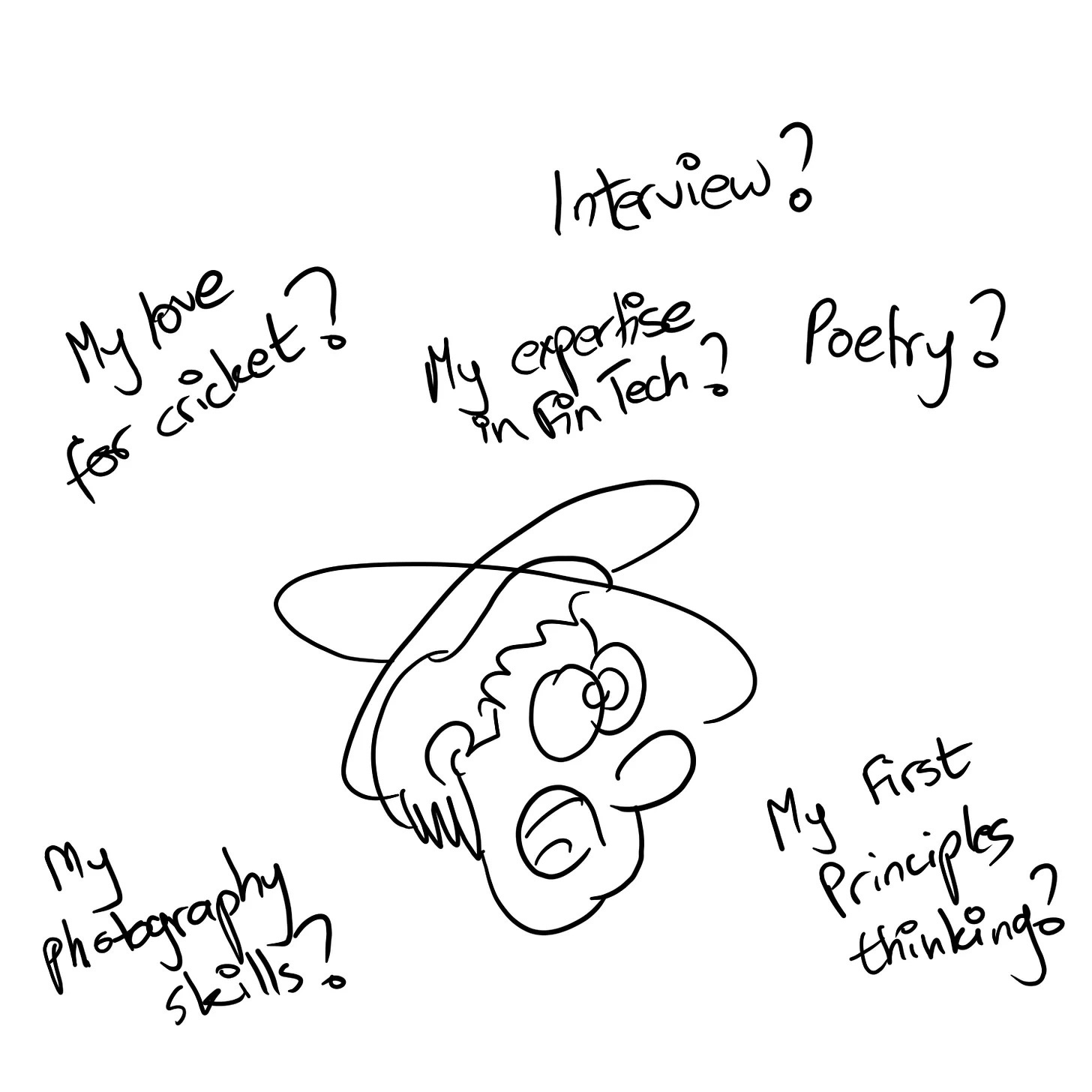
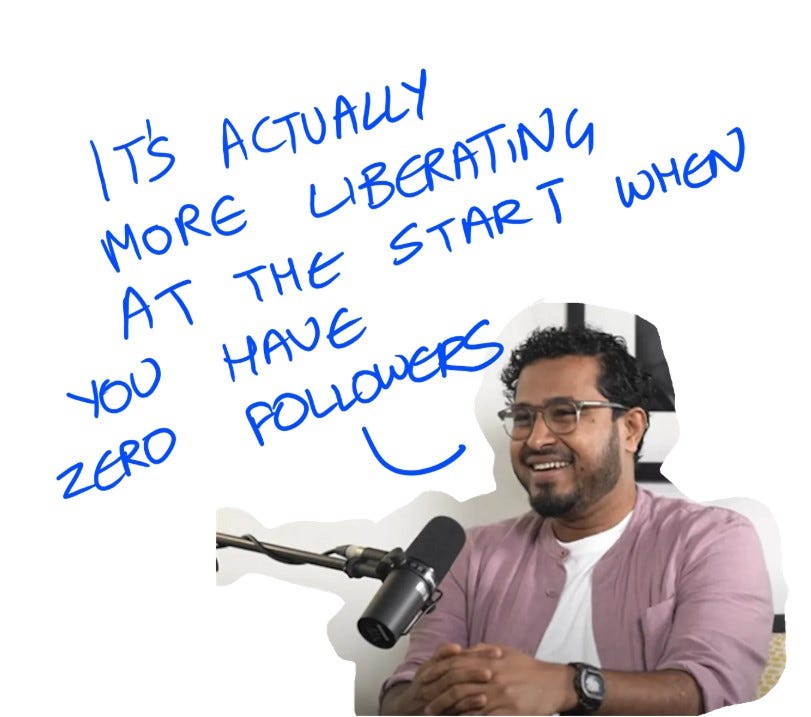
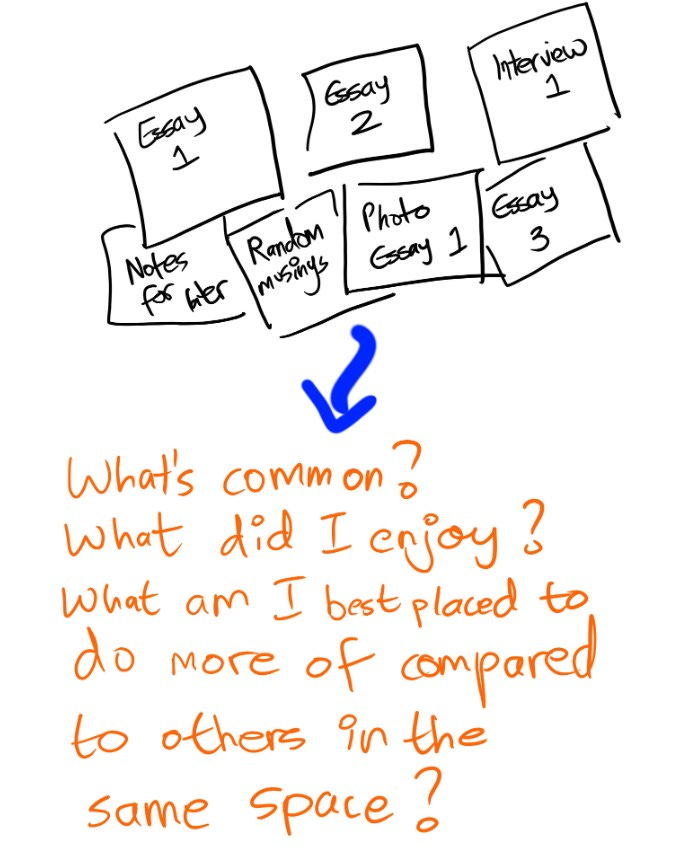
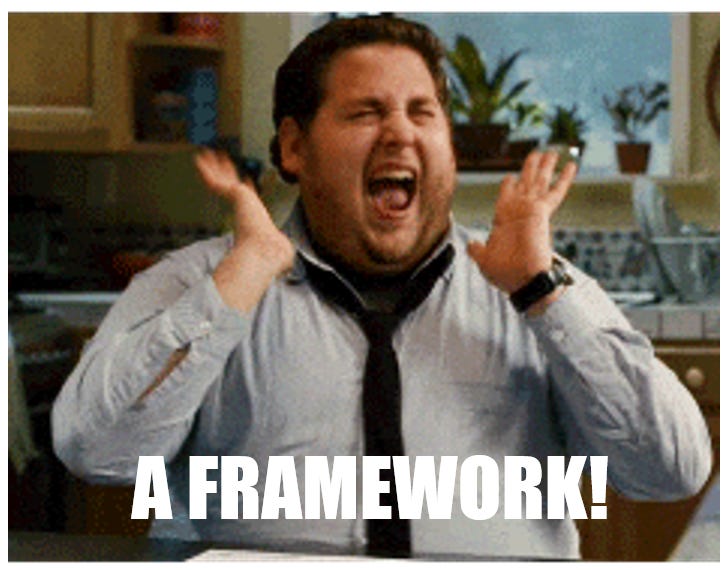
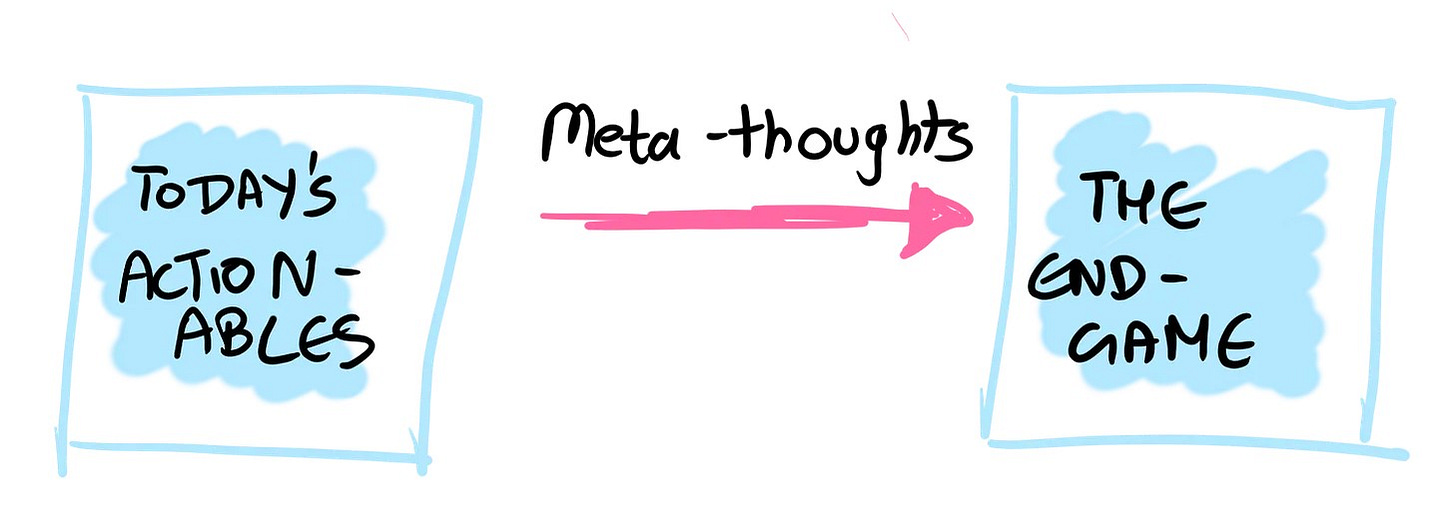
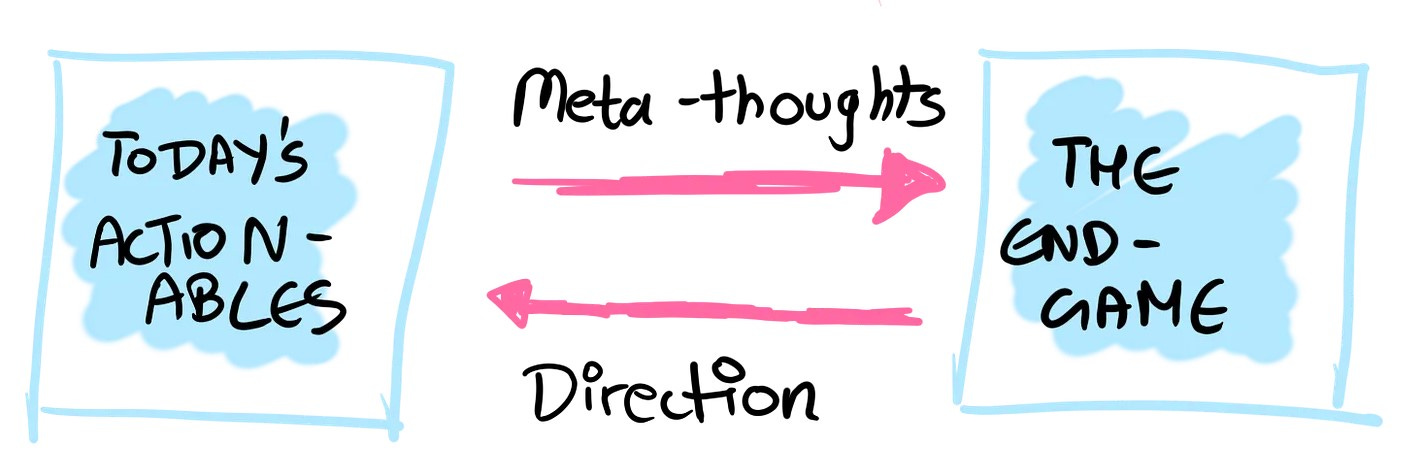
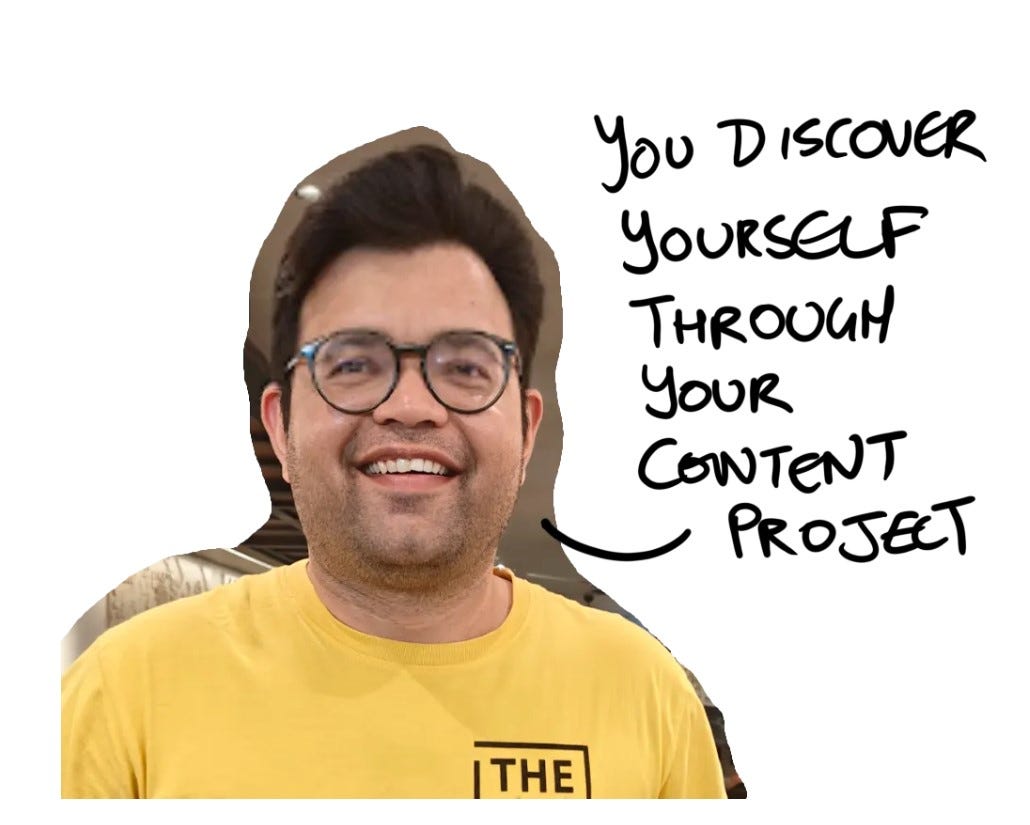
This was an excellent read Deepak. Lots to learn from this piece on finding your voice and not being too hard on yourself as a creator. Having fun is the most sustainable way to keep creating the content you love. And that is a good enough read to keep going!